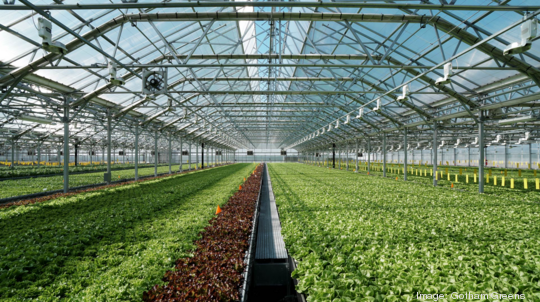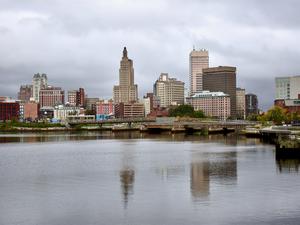
Rhode Islanders are eating more local food as the state sees new farmers and increased demand for urban agriculture, but additional investment and collaboration is needed to increase the consumption of locally grown products in lieu of imported foods, said one state official.
Julie Stelmaszyk, director of food strategy with the Rhode Island Commerce Corporation, outlined the gains the Ocean State has made in increasing food access — and the hurdles that remain ahead — as the keynote speaker at the University of Rhode Island's sixth annual Food Systems Summit last week.
“Since 2020 we’ve seen an increase in demand for farmers markets, up 44%,” she said. “So, we’re focused on boosting things like vertical farming and greenhouses so we can extend that growing season and have fresh food throughout the year.”
While past summits have focused on topics like food insecurity and the role of climate change in food production, this year’s event looked toward new systems and infrastructure in the Ocean State that could help improve food access.
“Six years ago, when we started this summit, controlled agriculture was on the tip of everyone’s tongue,” said Katherine Flynn, executive director of URI’s Business Center, which hosted the event. “The ability to grow food under glass is important in Rhode Island, since our climate dictates we only have about three months of the year that we can really grow things outside. Now you see controlled agriculture popping up everywhere, and we want to invest more to start to address some of the food challenges we face.”
Ideas born from the first summit can already be seen in some of Rhode Island’s food economy, Flynn said. And, she said there are several plans on the horizon, including a proposed innovation center to spur more business and technology partnerships as the university and state try to tackle food insecurity.
Nearly one in four households in the state are food insecure, according to the Rhode Island Food Bank. Flynn said the emergence of Covid-19 over the past few years has exacerbated the problem, especially in areas like Central Falls.
Stelmaszyk spent the last year traveling around Rhode Island and exploring the state’s food, agriculture and aquaculture industries. While improvements have been made navigating challenges imposed by Covid-19 over the past two years, she said, disruptions continue because Rhode Island still imports 90% of its food.
“I’ve seen how broken our food system was and how folks in the food service industry were disproportionately impacted economically, but also by the virus itself,” Stelmaszyk said. That said, Stelmaszyk said she’s hopeful that continued community partnership alongside Rhode Island’s institutions and public could help food insecurity and price inflation.
The summit also focused on how Rhode Island can leverage agricultural advancements, state-of-the-art facilities and groundbreaking new programs to increase food production in the state.
Over the last five years, Stelmaszyk said many states in the U.S. have seen a decline in farmers. But, Rhode Island bucked that trend, seeing an increase in beginner farmers, immigrant food producers and an uptick in demand for urban farming at places like the SouthSide Community Land Trust.
Aquaculture also saw a big jump in Rhode Island during that time; the sector increased by tenfold over the last decade. Stelmaszyk said that’s in part thanks to $25 million in investments, tax credits, grants and small business loans. The Rhode Island Commerce Corporation now supports more than 200 businesses in the growing sector. Additionally, Stelmaszyk said the state has worked to protect more than 700 acres of farmland in the last five years.
Viraj Puri, CEO of Gotham Greens, also attended and spoke to the company’s recent success transforming underutilized space in New York City, Chicago and most recently Providence, into massive hydroponic greenhouses.
The 10-year-old company announced late last year its further expansion with the opening of its first California greenhouse, which according to Puri, will save 270 million gallons of water a year, while occupying 300 fewer acres compared to traditional farming techniques.
Gotham Greens opened a location at the former Providence Base Works General Electric site in 2019. The site currently produces around 20 different types of lettuce utilizing natural light, a system of hydroponics and beneficial insects.
By implementing these innovations in food production, Stelmaszyk said they hope 30% of the food eaten in Rhode Island will come from local farms and businesses.







